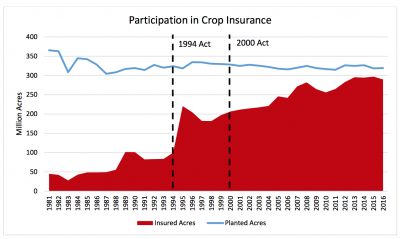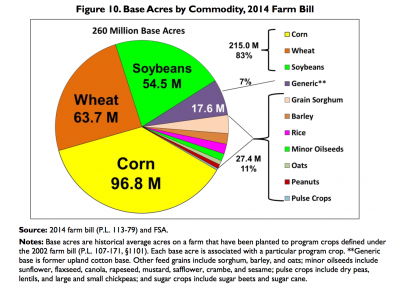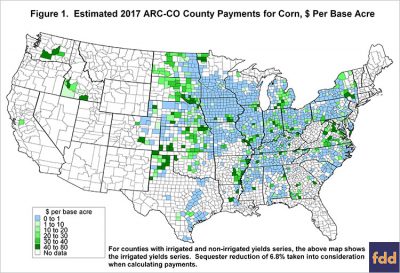Siobhan Hughes and Jesse Newman reported on the front page of Saturday’s Wall Street Journal that, “The House defeated a Republican-written farm bill on Friday after GOP leaders couldn’t win over a bloc of their party’s most conservative lawmakers, who were demanding a separate vote soon on a measure to toughen immigration enforcement.
“The conservatives, members of the House Freedom Caucus, broke with their party even as leaders tried to persuade them that an immigration measure they wanted to bring to the floor would come up in June as part of a series of other immigration votes. The group instead wanted an immediate vote on a specific bill that would reduce legal immigration and add enforcement measures.
“As a result, the farm bill was defeated, with 198 lawmakers in favor and 213 opposed. Thirty Republicans joined 183 Democrats in opposition.”
The Journal article noted that, “House GOP leaders needed most Republicans to stay on board because Democrats had already opposed the bill, objecting to new work requirements that would be imposed on food-stamp recipients.”
Politico writers Catherine Boudreau, Helena Bottemiller Evich, Rachael Bade, and Liz Crampton reported Friday that, “Rejection of the legislation is reminiscent of the last farm bill cycle in 2013, when the House also voted down a conservative version of the legislation, delaying the process for months. Ultimately, the sweeping bill was bailed out by Democrats the following year.”
The Politico article also reminded readers, “[Friday’s] vote came after a 48-hour standoff between GOP leadership and members of the Freedom Caucus. The bloc of conservatives held the bill hostage, demanding that the House first vote on controversial immigration legislation in exchange for their support for the sweeping agriculture and nutrition legislation.”
Reuters writers Amanda Becker and Susan Cornwell pointed out Friday that, “House Speaker Paul Ryan and Majority Leader Kevin McCarthy were seen on the floor of the chamber negotiating with Freedom Caucus lawmakers as the farm bill vote was under way.”
And Glenn Thrush and Thomas Kaplan reported on the front page of Saturday’s New York Times,
In reality, the farm bill, which has huge implications for low-income families and the agricultural industry, largely became a bargaining chip in the heated intraparty battle over immigration, President Trump’s core cultural and political issue.
The Times article noted, “The House’s farm bill was already destined to be set aside by the Senate, which has been working on its own bipartisan measure. The farm legislation will need 60 votes in the Senate, meaning that Republicans, even if they are unified, will not be able to pass a partisan bill in that chamber.”
Saturday’s article added, “[House Ag Committee Chairman Mike Conaway (R., Tex.)] and other mainstream Republicans from rural areas wanted to preserve backbone agricultural supports while fighting back challenges from the right to reduce subsidies. But he also sought to accommodate the White House and outside conservative groups, which demanded new election-year initiatives to reduce the rolls of the Supplemental Nutrition Assistance Program, or SNAP, which Mr. Trump regards, along with Medicaid and housing aid, as ‘welfare.'”
Washington Post writers Erica Werner and Mike DeBonis reported on the front page of Saturday’s paper that, “The farm bill had nothing to do with immigration, but House conservatives used it to try to regain leverage that they had been losing behind the scenes as party centrists worked to force a vote on a bill that would legalize young undocumented immigrants who arrived in the country as children.”
The Associated Press reported on Friday that, “As for the farm bill’s fate, the debacle appears to make it even more likely that Congress will simply extend the current farm bill when it expires in September.”
And Bloomberg writers Alan Bjerga and Erik Wasson reported Friday that, “President Donald Trump ‘is disappointed in the result of today’s vote,’ Lindsay Walters, deputy White House press secretary, said in a statement. Trump supported adding work requirements to the food stamp program. The administration ‘will continue to work with Congress to pass a farm bill on time.'”
Farm Bill- Amendments
In his weekly Email newsletter, House Ag Committee Ranking Member Collin Peterson (D., Minn.) explained that, “This week the House of Representatives considered the farm bill, and a number of amendments. I worked to defeat an amendment that would have devastated the domestic sugar industry and the thousands of jobs it supports in Minnesota.”

Rep. Peterson added, “I also fought against an amendment that would have made cuts to crop insurance as well as dairy and commodity safety net programs. These programs provide a critical backstop to protect against market swings and unpredictable weather which can wipe away a year of hard work in a blink of the eye. I was glad to soundly defeat these amendments because they are bad for agriculture and they make it harder to get a farm bill signed into law in the future.”
House Ag Committee Chairman Mike Conaway also referenced votes on in the amendment process on Friday. In a statement, he noted that, “We experienced a setback today after a streak of victories all week.”
In addition, Brownfield’s Larry Lee reported last week that, “A House Farm Bill amendment from Illinois Congressman Darin LaHood received strong support from Democrats and Republicans Thursday. ‘Under our amendment, farmers will be able and be eligible for a one-time sign-up for ARC and PLC for the duration of the five-year farm bill so long as there are no changes to the current farming operation.’

“LaHood told House members his One and-Done proposal would save farmers valuable time. ‘The amount of time spent filling out paperwork for these programs, even when there is no change to their farming operation, takes up too much time, too much of their valuable time which could be used on their farms.'”
Farm Bill- Going Forward
DTN Political Correspondent Jerry Hagstrom and DTN Ag Policy Editor Chris Clayton reported Friday, “The setback adds to the possibility of an extension that could complicate farmers’ ability to switch commodity programs next fall for their base acres. Declining revenue guarantees for the Agricultural Revenue Coverage (ARC) have led to the likelihood that farmers enrolled in ARC are looking for the chance to switch at least some farms to Price Loss Coverage (PLC) for their safety net.”

Hagstrom and Clayton pointed out that, “Peterson said that the bill can still get done this year, but an extension would have only two problems:
farmers’ inability to change from the Agricultural Risk Coverage to the Price Loss Coverage program, and no increase in acreage under the Conservation Reserve Program. The dairy program has already been fixed, he said.
And Bloomberg writers Alan Bjerga and Erik Wasson reported on Saturday that, “Some Democrats see an opportunity amid the Republican disarray, saying that if Ryan were willing to eliminate the new food stamp rules, they could help pass a bill.
“‘This is a good opportunity for us to return to the table and fix this bill before we move forward,’ said Representative Collin Peterson of Minnesota, the top Democrat on the House Agriculture Committee.”
The Bloomberg article added, “Steve Scalise of Louisiana, the No. 3 House Republican, said leaders would continue to seek to address Freedom Caucus immigration concerns to get the farm legislation passed. ‘The farm bill is an important bill. We’re not done with it,’ he said.”
Source : Farm Policy News